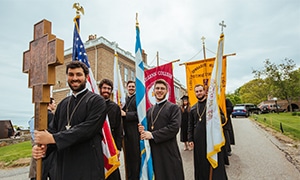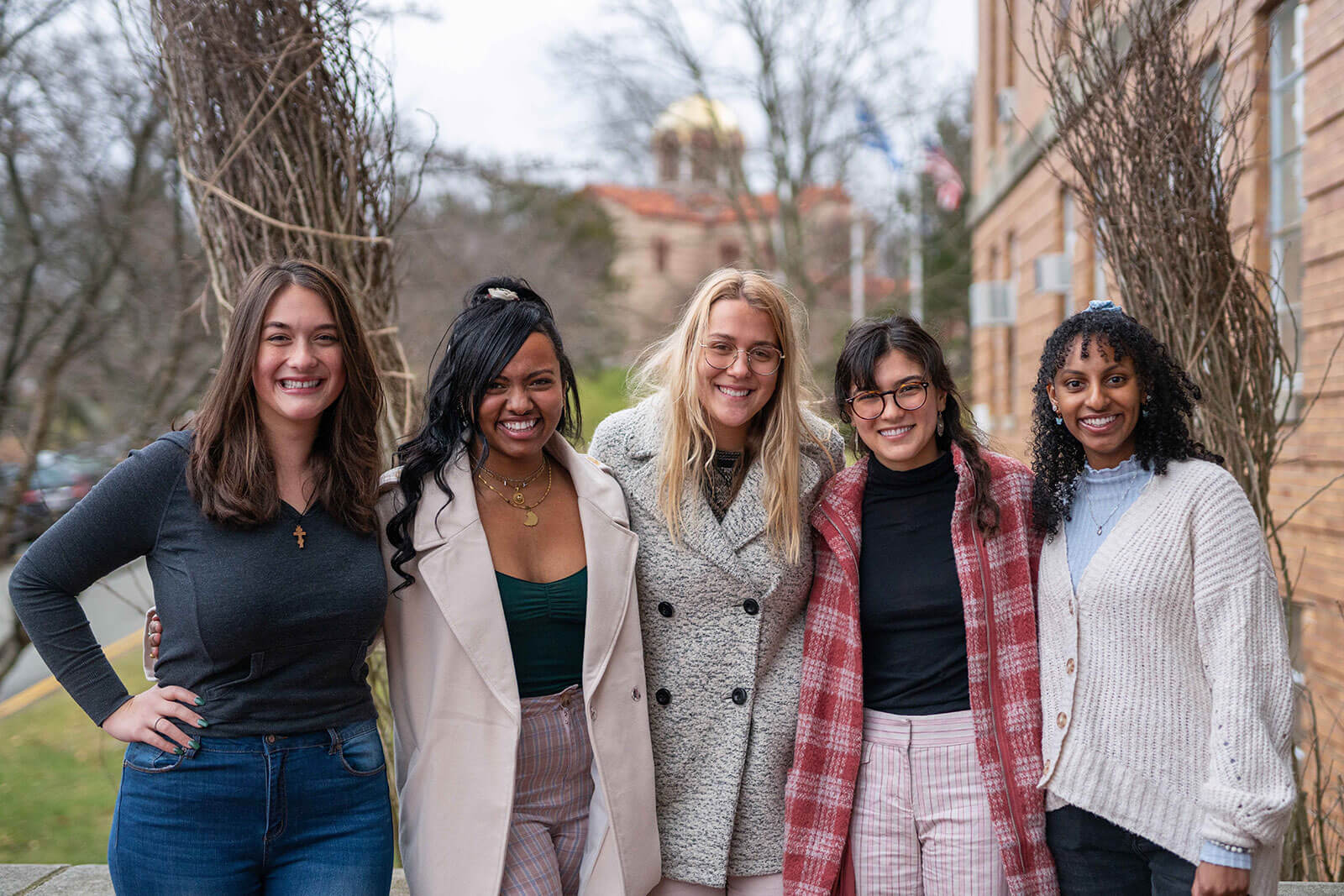HOLY CROSS DIACONATE PROGRAM ANOTHER SUCCESSFUL SUMMER

By Rev Dn. Salvatore Michael Fazio
The question often gets asked: did Holy Cross, during the current COVID-19 pandemic, hold the annual educational and formational summer session of the Program for the Diaconate? The short answer is that the Diaconate Program is alive and well, it did indeed meet this summer, and the program just completed its fourteenth consecutive year of service to the Church in training future deacons for the building up of the body of Christ. Normally, each summer the Program for the Diaconate holds a 9-day summer session on the campus of Holy Cross where first, second and third year candidates for the diaconate participate in educational and formational courses as they prepare for future ordination. Although the pandemic forced the 2020 summer session to move online, this did not stop the theological, spiritual and formational aspects of the program from being offered. A record number of students, 42 in total, participated in this summer’s online program. These 42 Individuals were from across the country and eagerly studied theology, learned liturgical rubrics for the Sacraments, and shared in spiritual fellowship via the online courses and fellowship gatherings. Due to the pandemic, new friendships were forged and old acquaintances renewed via Zoom; but most importantly, each of the 42 candidates demonstrated their dedication towards realizing their calling to serve Christ and His Church through the holy diaconate.
The Program for the Diaconate got its start in 2005, when the Holy Eparchial Synod of the Greek Orthodox Archdiocese of America requested that the faculty of Holy Cross create a program to train deacons to assist clergy with their parish duties and help out with the needs of the Metropolises. In 2007, Holy Cross enrolled its first candidates; three men arrived that summer as the first cohort of diaconate students. In addition, a deacon from the Metropolis of Atlanta joined the other three men in order to enhance his theological and liturgical knowledge. Since those humble beginnings approximately 140 candidates have enrolled in the program. Of those who have completed the program, 42 have been ordained to the diaconate and 24 are eligible candidates for ordination who are at various stages in the process of receiving the Church’s blessing to be ordained to the diaconate. The majority of candidates who are enrolled in or have gone through the program are men from the Greek Orthodox Archdiocese of America, although candidates from the Orthodox Church in America and the Albanian Orthodox Diocese of America have completed the program and been ordained in their respective jurisdictions.
Since the arrival of the first cohort of students in 2007, the program has not faced a greater challenge than it did this summer in trying to provide fellowship and education to its enrolled candidates online. It was only by the grace of God and the hard work and dedication of Holy Cross Faculty and Staff that this year’s session was a success.
Once the HCHC DP Faculty and Staff decided on the Program online course of action the candidates and mentors were made aware of the online framework of the revised Program schedule prior to the program formal start. The clergy mentors of all the current candidates gathered via Zoom for fellowship and a discussion regarding the revised summer program due to the pandemic. These clergy mentors are a critical component to the Diaconate Program as they serve as on-the-ground mentors (spiritually and liturgically) for the candidates as they proceed through the program. Some forty clergy mentors were in attendance and offered their extensive wisdom and experience as prior deacons and seasoned clergy. Their insights, dedication and willingness to help with the formation of the diaconate candidates in these difficult times have been and continue to be critical to the success of the program.
As with previous summer sessions, the Holy Cross Diaconate Program staff wanted to maintain the general structure of the summer session that has proven so successful over the years. It is a yearly tradition that each summer session begins with a welcome BBQ. On May 30th the 2020 summer session kicked off with a Virtual Lamb BBQ video conference call. The evening program welcomed back alumni and all new and returning candidates. The BBQ was a great success with over 62 attendees, an opening and closing prayer by Fr. Peter Chamberas, and a special guest appearance with some opening comments from Archdeacon Rev. Dr. John Chryssavgis.
The academic/theological courses offered this summer included: The Sacraments taught by Dr. Philip Zymaris (June 1 – 5, 2020), The Bible in Orthodoxy taught by Dr. Bruce Beck(June 8 – 12, 2020), and Orthodox Theology and Basic Doctrines taught by Rev. Dr. Emanuel Clapsis (June 15 – 19, 2020). The courses were offered as a combination of asynchronous and synchronous learning. Each professor produced 5 recorded video lectures (45 mins in length) that the students watched on their own time. The students then gathered with the professor for five 1.5 hour sessions to discuss the lecture and the readings. Additionally, each student was required to post responses to daily questions listed by the professor. Several candidates commented that the courses changed their lives and they will never look at Liturgy, the Church, or Scripture the same way.
Following the completion of the classes, several additional online opportunities for fellowship, liturgical training, and general theological and pastoral conversations were provided. These included the following video conference calls:
First-year candidates gathered for their own online open discussion with the Program Coordinator Dr. Jim Skedros and Rev. Dn. Sal Fazio, Director of Outreach for the Diaconate Program. They listened to feedback from the classes and offered thoughts on how to set goals that are achievable for the next year of formation with their clergy mentor. It was stressed that a healthy Christian relationship between the clergy mentor and the candidate is crucial to a productive candidacy and positive humble service to the Church.
Second-year candidates met with Dr. Skedros and Rev. Dn. Sal and discussed ways to live the Liturgy in humble service to their Metropolitan, priest and community. Now that the candidates made it to this halfway point of the program they were encouraged to offer as much ministry to their priest and community, based on their God-given gifts, as their family and work schedule allow.
The third-year candidates met online with Rev. Dn. Sal Fazio where candidates reviewed a recent diaconate ordination video, studied the prayers read over a candidate at ordination, and discussed next steps after completing the Diaconate Program.
Each year the program invites a guest speaker to address the candidates. This year’s Diaconate Program guest speaker was Dr. Aristotle Papanikolaou, Archbishop Demetrios Chair in Orthodox Theology and Culture (Fordham University) who offered a focused lecture and reflections on the topic of “The Diaconate Today”. It was well received with over 60 people in attendance.
An additional important component of the Diaconate Program is the Metropolis Regional Groups. Each Metropolis held its own regional group during the month of August. Some groups, with the blessing of the local Metropolitan, were able to gather in person as long as they followed local governmental guidelines for COVID-19. Most groups, however, met remotely via video conferencing. Regional leaders were as follows: Fr. Steven Tsichlis and Dn. Daniel Cunningham (San Francisco), Fr. Elias Villis and Dn. Anastaci Hallas (Archdiocesan District), Fr. Evan Armatas and Dn. Eugene Todd (Denver North), Fr. Vasileios Flegas and Dn. Sal Fazio (Denver South), Fr. Paul Costopoulos and Dn. Tycon Cobb (Atlanta), Fr. Tom Chininis and Dn. John Vaporis (Boston), Archdeacon Vasilios Smith (Chicago), Fr. Christopher Abell (Detroit West), Fr. Michael Bahlatzis and Dn. Vasili Yacalis (Detroit East), Dn. Haralambos Chelpon (New Jersey), and Dn. Haralambos Lykos (Pittsburgh). At the conclusion of some of the regional group gatherings, the third-year candidates, where possible, were presented with their certificate of completion of the Diaconate Program. The certificates were presented to the candidate by his clergy mentor in front of the community at the conclusion of Divine Liturgy.
The Diaconate Program is under the direction of the Holy Eparchial Synod and the Faculty of Holy Cross and is intended to provide parishes with trained deacons who can assist with the liturgical and pastoral needs of a community. Ordained graduates of the Program are under the omophorion of their local Metropolitan. The Program provides those called to service in the Church as a deacon the opportunity to be trained, and tested as they discern their calling. The program is for the holy diaconate; individuals with a calling to the priesthood are encouraged to enroll in the Master of Divinity degree program at Holy Cross.
By the grace of God, the Program continues to grow and by His will continues to nurture those that sense a calling to the holy diaconate in the Orthodox Church. For more information about the Diaconate Program please visit the rogram’s website at http://kgsv.mmmukg.com/academics/diaconate_program/ or email Dn. Sal Fazio at sfazio@mmmukg.com.
 MyHCHC
MyHCHC



